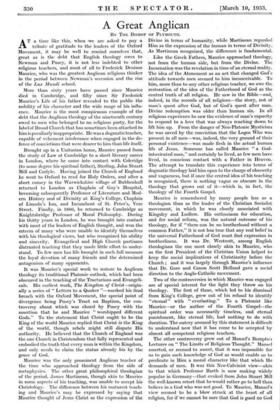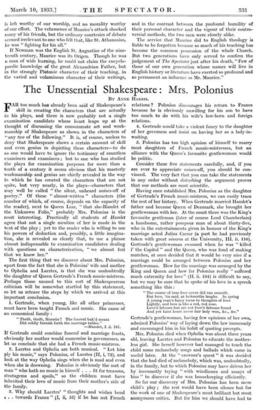A Great Anglican
BY THE BISHOP OF PLYMOUTH.
AT a time like this, when rwe are asked to pay a tribute of gratitude to the leaders of the Oxford Movement, it may be well to remind ourselves that, great as is the debt that English theology owes to Newman and Pusey, it is not less indebted to other religious teachers, and most of all to Frederick Denison Maurice, who was the greatest Anglican religious thinker in the period between Newman's secession and the rise of the Lux Ulundi school.
More than sixty years have passed since Maurice died in Cambridge, and fifty since Sir Frederick Maurice's Life of his father revealed to the public the nobility of his character and the wide range of his influ- ence. Maurice is the most conspicuous• example of the debt that the. Anglican theology of the nineteenth century owed to men who belonged to no religious party, for the label of Broad Church that has sometimes been attached to him is peculiarly inappropriate. He was a dogmatic teacher, capable of vehement intolerance when engaged in the de- fence of convictions that were dearer to him than life itself.
Brought up in a Unitarian home, Maurice passed from the study of Law at Cambridge to a short literary career in London, where he came into contact with Coleridge (to some degree his spiritual father), Sterling, John Stuart Mill and Carlyle. Having joined the Church of England he went to Oxford to read for Holy Orders, and after a short curacy in the Warwickshire village of Bubbenhall returned to London as Chaplain of Guy's Hospital, becoming subsequently Professor of Literature and Mod- em History and of Divinity at King's College, Chaplain of Lincoln's Inn, and Incumbent of St. Peter's, Vere Street. Finally, in 1866, he returned to Cambridge as Knightsbridge Professor of Moral Philosophy. During his thirty years in London, he was brought into contact with most of the leaders of English thought, and won the esteem of many who were unable to identify themselves with his theological views, but who recognized his ability and sincerity. Evangelical and High Church partisans distrusted teaching that they made little effort to under- stand. To few men has life brought in such full measure the loyal devotion of many friends and the determined antagonism of many opponents.
It was Maurice's special work to restore to Anglican theology its traditional Platonic outlook, which had been obscured in the teaching of the Tractarians and Evangeli- cals. His earliest work, The Kingdom of Christ—origin- ally a series of " Letters to a Quaker "—marked his final breach with the Oxford Movement, the special point of divergence being Pusey's Tract on Baptism, the con- troversy about which was closed by Pusey with the assertion that he and Maurice " worshipped different Gods." To the statement that Christ ought to be the King of the world Maurice replied that Christ is the King of the world, though rebels might still dispute His authority. He believed that the Church of England was the one Church in Christendom that fully represented and embodied the truth that every man is within the Kingdom, and only needs to claim the status already his by the grace of God.
Maurice was the only prominent Anglican teacher of the time who approached theology from the side of metaphysics. The other great philosophical theologian of the period, James Martineau, though akin to Maurice in some aspects of his teaching, was unable to accept his Christology. The difference between his maturest teach- ing and Maurice's may be expressed by saying that Maurice thought of Jesus Christ as the expression of the Divine in terms of humanity, while Martineau regarded Him as the expression of the human in terms of Divinity. As Martineau recognized, the difference is fundamental.
Like the Greek Fathers, Maurice approached theology, not from the human side, but from the Divine. The Incarnation was the revelation in time of an eternal reality. The idea of the Atonement as an act that changed God's attitude towards men seemed to him inconceivable. To him, more than to any other religious teacher, we owe the restoration of the idea of the Fatherhood of God as the central truth of all religion. He saw in the Bible—and, indeed, in the records of all religions—the story, not of man's quest after Cod, but of God's quest after man. Divine redemption was older than human sin. In all religious experience he saw the evidence of man's capacity to respond to a love that was always reaching down to lift him up. From the danger of Neo-Platonic Mysticism he was saved by the conviction that the Logos Who was present in all men—was, indeed, the very ground of their personal existence—was made flesh in the actual human life of Jesus. Someone has called Maurice " a God- intoxicated man," and certainly he lived, as few men have lived, in conscious contact with a Father in- Heaven.- The attempt to translate this experience into terms of dogmatic theology laid him open to the charge of obscurity and vagueness, but if once the central idea of.his teaching is recognized, there is nothing vague or obscure in the theology that grows out of it—which is, in fact, the theology of the Fourth Gospel.
Maurice is remembered by many people less as a theologian than as the leader of the Christian Socialist movement, in which he was closely associated with Kingsley and Ludlow. His enthusiasm for education, and for social reform, was the natural outcome of his theology, for if "there can be no brotherhood without a common Father," it is not less true that any real belief in the universal Fatherhood of God must find expression in brotherliness. It was Dr. Westcott, among English theologians the one most closely akin to Maurice, who as the first President of the Christian Union helped to keep the social implications of Christianity before the Church ; and it was largely through Maurice's influence that Dr. Gore and Canon Scott Holland gave a social direction to the Anglo-Catholic movement. .
Two of the controversies in which Maurice was engaged are of special interest for the light they throw on his theology. The first of these, which led to his dismissal from King's College, grew out of his refusal to identify " eternal " -with .".everlasting." To a Platonist like Maurice—or the author of the Fourth Gospel—the spiritual order was necessarily timeless, and eternal punishment, like eternal life, had nothing to do with duration. The outcry aroused by this statement is difficult to understand now that it has come to be accepted by almost all competent religious teachers.
The other controversy grew out of Mansel's Bamptou Lectures on " The Limits of Religious Thought." Mansel asserted, or seemed to assert, that it was impossible for us to gain such knowledge of God as would enable us to predicate in Him a moral character like that which He demands of men. It was this Neo-Calvinist view—akin to that which Professor Barth is now making widely popular in Germany—that evoked from John Stuart Mill the well-known retort that he would rather go to hell than believe in a God who was not good. To Maurice, Mansel's view seemed to be a blow struck at the heart of all religion, for if we cannot be sure that God is good no God is left worthy of our worship, and no morality worthy of our effort. The vehemence of Maurice's attack shocked many of his friends, but the ordinary courtesies of debate seemed irrelevant to one who felt that, like St. Athanasius, he was " fighting for his all."
If Newman was the English St. Augustine of the nine- teenth century, Maurice was its Origen. Though he was a man of wide learning, he could not claim the encyclo- paedic knowledge of the great Alexandrian Father, but in the strongly Platonic character of their teaching, in the varied and voluminous character of their writings, and in the contrast between the profound humility of their personal character and the vigour of their contro- versial methods, the two men were closely alike.
The service that Maurice did to English theology is liable to be forgotten because so much of his teaching has become the common possession of the whole Church. But two generations have only served to confirm the judgement of The Spectator just after his death, "Few of those of our own generation whose names will live in English history or literature have exerted so profound and so permanent an influence as Mr. Maurice."







































 Previous page
Previous page